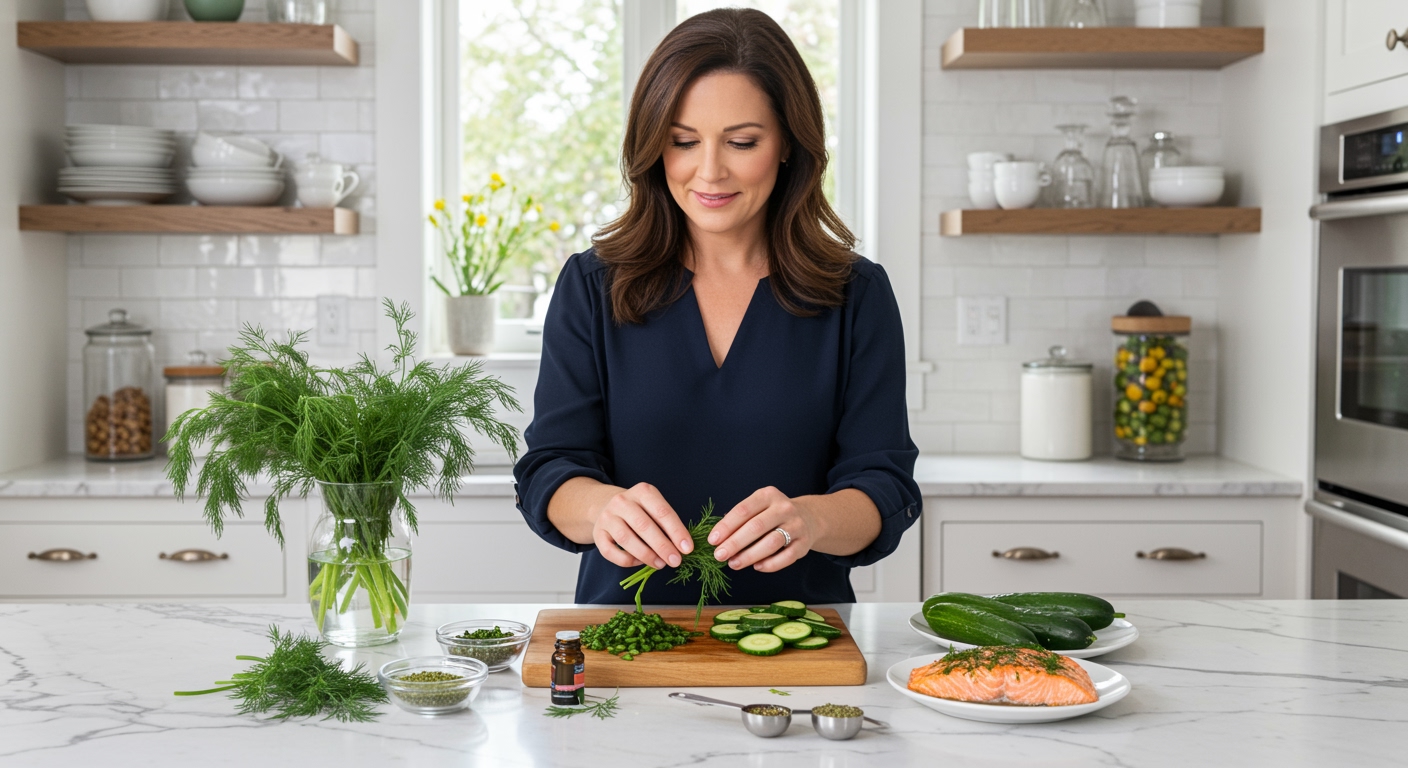✪ Key Takeaway: Dill offers modest benefits for PCOS through antioxidants and anti-inflammatory compounds but should complement, not replace, proven treatments.
Introduction
You walk through the grocery store and spot fresh dill in the herb section.
Maybe you heard somewhere that dill might help with PCOS symptoms and wonder if this common herb could be your missing piece.
Hi, I’m Abdur, your nutrition coach and today I’m going to explain exactly how dill affects PCOS and whether it deserves a place in your management strategy.
What Makes Dill Special For Women’s Health?
Dill contains unique compounds called monoterpenes that give it both flavor and potential health benefits.
The herb provides carvone and limonene, two substances that research shows have anti-inflammatory properties.
These compounds work by reducing inflammatory markers in your bloodstream, which is important because PCOS creates chronic low-grade inflammation.
Dill also contains flavonoids like quercetin that act as antioxidants in your body.
Your cells face constant oxidative stress from PCOS-related hormonal imbalances, and antioxidants help protect against this damage.
✪ Fact: Fresh dill contains more active compounds than dried dill, making it the better choice for potential health benefits.
How Does Dill Affect Insulin Resistance?
Insulin resistance drives many PCOS symptoms, and dill shows promise in improving how your cells respond to insulin.
Animal studies suggest that dill extract can lower blood glucose levels by enhancing insulin sensitivity.
The mechanism involves activating specific enzymes that help your muscle and liver cells take up glucose more efficiently.
However, these studies used concentrated extracts at doses much higher than what you would get from eating dill as food.
The realistic impact of adding dill to your meals on insulin resistance remains modest at best.
You should view dill as a supportive addition rather than a primary treatment for insulin resistance.
✪ Pro Tip: Combine dill with protein-rich foods to maximize its potential blood sugar benefits during meals.
Can Dill Help Balance Hormones In PCOS?
PCOS disrupts your hormonal balance through elevated androgens and irregular menstrual cycles.
Some traditional medicine systems claim dill has hormone-regulating properties, but scientific evidence remains limited.
The anti-inflammatory effects of dill might indirectly support hormonal balance by reducing systemic inflammation.
Chronic inflammation interferes with your hypothalamic-pituitary-ovarian axis, the system that controls reproductive hormones.
By potentially reducing inflammation, dill could create a more favorable environment for normal hormone production.
Still, no direct studies show dill significantly lowering testosterone or improving ovulation in women with PCOS.
✪ Note: Dill cannot replace proven PCOS treatments like metformin or hormonal contraceptives for hormone regulation.
What About Weight Management With Dill?
Weight management challenges affect up to 80 percent of women with PCOS due to metabolic dysfunction.
Dill is naturally very low in calories while adding significant flavor to your meals.
Using herbs like dill helps you create satisfying, flavorful dishes without relying on high-calorie sauces or seasonings.
The fiber content in fresh dill, though small, contributes to your overall fiber intake which supports satiety.
Some research suggests that aromatic compounds in herbs like dill might influence appetite regulation through smell and taste pathways.
However, dill alone will not cause significant weight loss without broader dietary and lifestyle changes.
✪ Pro Tip: Use fresh dill to flavor lean proteins and vegetables, making healthy meals more enjoyable and sustainable.
How Should You Use Dill For PCOS?
The most practical approach involves incorporating fresh dill into your regular meals rather than taking supplements.
Add chopped fresh dill to Greek yogurt for a protein-rich snack that supports blood sugar stability.
Mix dill into egg dishes or use it to season grilled fish and chicken for anti-inflammatory meals.
Fresh dill works well in salad dressings made with olive oil, providing healthy fats alongside the herb’s compounds.
You can also use dill to flavor roasted vegetables, making nutrient-dense foods more appealing.
Aim for using dill several times per week rather than expecting dramatic results from occasional use.
✪ Fact: Dill pairs exceptionally well with salmon, which provides omega-3 fatty acids that also help reduce PCOS inflammation.
The Bottom Line
Dill offers modest benefits for PCOS through its anti-inflammatory and antioxidant properties, but it works best as part of a comprehensive approach.
Small herbs can create big changes when used consistently alongside proven strategies, so do not underestimate the power of adding flavor and nutrients to your daily meals.
I would love to hear about your experience with herbs like dill or any questions you have about natural approaches to PCOS management in the comments below.
References
At NutritionCrown, we use quality and credible sources to ensure our content is accurate and trustworthy. Below are the sources referenced in writing this article:





